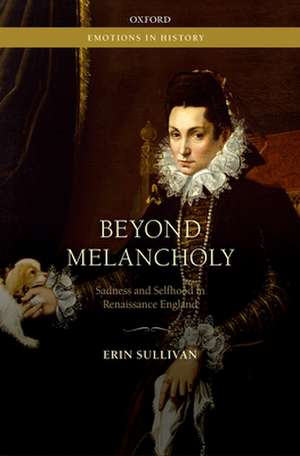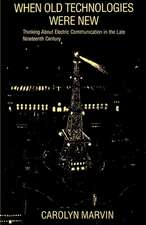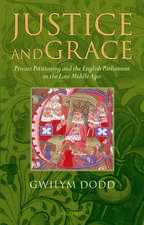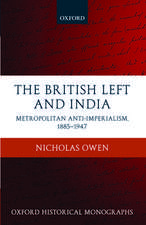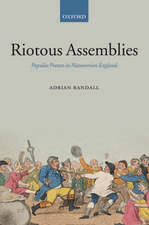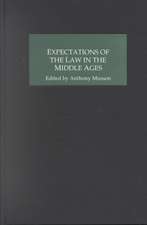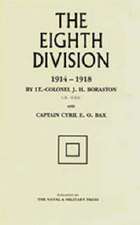Beyond Melancholy: Sadness and Selfhood in Renaissance England: Emotions In History
Autor Erin Sullivanen Limba Engleză Hardback – 3 mar 2016
Preț: 627.52 lei
Preț vechi: 858.49 lei
-27% Nou
Puncte Express: 941
Preț estimativ în valută:
120.07€ • 125.37$ • 99.38£
120.07€ • 125.37$ • 99.38£
Carte tipărită la comandă
Livrare economică 25-31 martie
Preluare comenzi: 021 569.72.76
Specificații
ISBN-13: 9780198739654
ISBN-10: 0198739656
Pagini: 242
Ilustrații: 21 black and white images
Dimensiuni: 164 x 235 x 20 mm
Greutate: 0.51 kg
Editura: OUP OXFORD
Colecția OUP Oxford
Seria Emotions In History
Locul publicării:Oxford, United Kingdom
ISBN-10: 0198739656
Pagini: 242
Ilustrații: 21 black and white images
Dimensiuni: 164 x 235 x 20 mm
Greutate: 0.51 kg
Editura: OUP OXFORD
Colecția OUP Oxford
Seria Emotions In History
Locul publicării:Oxford, United Kingdom
Recenzii
Sullivans sustained examination of the 'more personal and practical manifestations' of sadness are refreshingly sensitive to, and engagingly positive about, the easily obscured felt experience of a historically specific but messy emotion.
[a] fine first book ... Sullivan's very readable study draws on sources as diverse as moral treatises, mortality records, devotional poetry, letters and ballads.
brilliant ... Sullivan's masterstroke is to show that the world of letters and of drama unlocks the history of experience, connecting discursive debates about conceptual incommensurabilities to a lived reality in which the meaning of embodied and spiritual feelings were sought.
an elegant study ... This book is significant for complicating our understanding of sadness to encompass not only the corporeal and medical but also the religious, philosophical and immaterial ... Beyond Melancholy shows the value of literary texts and methods to the history of emotions and to the history of medicine more broadly.
Erin Sullivan's scholarly and consistently engaging contribution to OUP's Emotions in History series, Beyond Melancholy, sets out not only to add nuance, local complexity, and taxonomic specificity to broad period conceptions of sadness, but also to make sadness less depressing, showing how depictions of this temperamental excess may be pervasive but not exclusively negative ... Sullivan has recourse to an impressive array of period texts and sources, often devoting considerable time to detailed, and often suitably graphic, accounts of medical practice and case-records, full of scurvy, flatulence, cramps, and fluids. This study, quite intentionally and to its credit, is as comfortable with medical history as cultural history ... There is a real wealth of material here for future scholars
Erin Sullivan's remarkably wide-ranging new book achieves a level of scholarly balance that would secure the approval of any discerning Renaissance physician. In it, she sifts a large and diverse range of historical sources to offer colour and nuance to many 'emotionologies' (conventions) of sadness, recent and contemporary, and their relationships with differing and dominant conceptions of self, body, mind and soul.
This book has helped me further appreciate the complexity of human emotions and has shown me the relevance of an unfamiliar period of history to my daily clinical practice.
Erin Sullivan's Beyond Melancholy offers ample proof of how much there is still to be gained from an in-depth, meticulously contextualized study of an emotion. Marshalling an impressive array of sources ... Beyond Melancholy offers a powerfully synthesizing approach which is nevertheless careful to respect the multi-faceted, contested and often seemingly contradictory ways in which sadness was experienced, viewed by different interpretative communities, and represented.
[a] fine first book ... Sullivan's very readable study draws on sources as diverse as moral treatises, mortality records, devotional poetry, letters and ballads.
brilliant ... Sullivan's masterstroke is to show that the world of letters and of drama unlocks the history of experience, connecting discursive debates about conceptual incommensurabilities to a lived reality in which the meaning of embodied and spiritual feelings were sought.
an elegant study ... This book is significant for complicating our understanding of sadness to encompass not only the corporeal and medical but also the religious, philosophical and immaterial ... Beyond Melancholy shows the value of literary texts and methods to the history of emotions and to the history of medicine more broadly.
Erin Sullivan's scholarly and consistently engaging contribution to OUP's Emotions in History series, Beyond Melancholy, sets out not only to add nuance, local complexity, and taxonomic specificity to broad period conceptions of sadness, but also to make sadness less depressing, showing how depictions of this temperamental excess may be pervasive but not exclusively negative ... Sullivan has recourse to an impressive array of period texts and sources, often devoting considerable time to detailed, and often suitably graphic, accounts of medical practice and case-records, full of scurvy, flatulence, cramps, and fluids. This study, quite intentionally and to its credit, is as comfortable with medical history as cultural history ... There is a real wealth of material here for future scholars
Erin Sullivan's remarkably wide-ranging new book achieves a level of scholarly balance that would secure the approval of any discerning Renaissance physician. In it, she sifts a large and diverse range of historical sources to offer colour and nuance to many 'emotionologies' (conventions) of sadness, recent and contemporary, and their relationships with differing and dominant conceptions of self, body, mind and soul.
This book has helped me further appreciate the complexity of human emotions and has shown me the relevance of an unfamiliar period of history to my daily clinical practice.
Erin Sullivan's Beyond Melancholy offers ample proof of how much there is still to be gained from an in-depth, meticulously contextualized study of an emotion. Marshalling an impressive array of sources ... Beyond Melancholy offers a powerfully synthesizing approach which is nevertheless careful to respect the multi-faceted, contested and often seemingly contradictory ways in which sadness was experienced, viewed by different interpretative communities, and represented.
Notă biografică
Erin Sullivan is a Senior Lecturer and Fellow at the Shakespeare Institute, University of Birmingham. Her work focuses on the relationship between emotion, culture, and identity, both in Shakespeare's time and today. She is the co-editor of The Renaissance of Emotion: Understanding Affect in Shakespeare and His Contemporaries (2015) and Shakespeare on the Global Stage: Performance and Festivity in the Olympic Year (2015).
